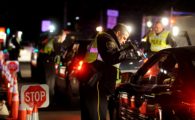The Vista DUI lawyer with over 30 years expertise, David Pflaum aggressively defends his clients to get the right results.
Just because a person was arrested for driving under the influence does not mean that the person is guilty. The person has many constitutional rights and remedies.
An experienced criminal lawyer makes a difference in the outcome of a driving under the influence prosecution.
VISTA DUI LAWYER DEFENSE SERVICES
The professional defense of DUI begins with a consultation with the client to learn about the facts of the detention and the arrest. Mr. Pflaum also learns about the client’s general background.
Nest Mr. Pflaum analyzes the file presented by the prosecution that typically includes the police investigation reports and conclusions, witness statements, statements by the client, body-worn videos, patrol car mounted videos, breath test results, and blood test results.
The most effective defense strategies that attorney Pflaum may invoke in order to effectively defend his client include the following.
- No proof the client was the driver
- No proof of impairment
- Rising blood alcohol defense
- No warrant for a blood draw
- Faulty chemical testing
- No signs of impaired driving
- Insufficient evidence to prove the charges
- No proof beyond a reasonable doubt
- Violation of the right to remain silent
- Coerced confession
- Inconsistent police testimony
- Unlawful detention of the client
Other important areas of inquiry that Mr. Pflaum may utilize to defend the case include the following.
The Detention. An important way to defend an accusation of DUI is to determine whether the police had a valid reason to detain the driver. If the California Highway Patrol is involved, there should be a mobile video audio recording system (MVARS) of the driver operating his or her vehicle before he or she was pulled over.
Sobriety. Body worn cameras are helpful to determine whether the field sobriety tests were properly administered, and whether the detained person was able to properly comply with the requests of the police. Body worn camera video can also prove that the person showed no signs of impairment.
Sobriety Checkpoint. If a person was detained at a sobriety checkpoint, there are procedures the police must follow in order to obey the law. If the police did not follow the procedures, a judge may dismiss the case.
Field Sobriety Tests. The results of field sobriety tests can vary from person to person. Most experts agree that field sobriety tests are coordination tests that do not significantly evaluate a person for sobriety.
The police almost always claim that a person failed the field sobriety tests, but there are numerous ways to show that a person performed them well and that therefore the person was not under the influence.
Alcohol Tests. There are three separate tests available to law enforcement: 1) a preliminary alcohol screening device (PAS); 2) an intoxilizer breath machine; 3) a blood test.
The PAS test is a small hand-held unit that requires consent from the driver. The officer administering the PAS device must be properly trained. The PAS device must be properly maintained with regular written logs for the PAS device.
The intoxilizer machine is located at the jail and requires certifications that the officer observed the client continuously for 15 minutes prior to taking a breath sample, that the machine was tested prior to and after the person gave a breath sample, and has been properly maintained with written calibration logs.
A blood test requires the consent of the person who was arrested or a warrant. The results of the blood sample are not available for 2-3 weeks, and may be retested by an independent forensic toxicologist.
Driving Pattern. The manner in which a person was driving is an important factor. Good driving is an indicator that the person is not impaired. If a person was pulled over for a minor equipment violation, that would not be considered bad driving that shows impairment.
Resolution. An alternative method to resolve a case of driving under the influence is by way of a plea bargain. A plea bargain is an agreement between the defense lawyer, his client, the judge and the prosecutor to eliminate or reduce the original criminal charges, and to avoid or minimize the amount of time in jail.
Good plea bargains come about because attorney Pflaum knows his client well, investigates the case, carefully analyzes the police reports, the medical records, videos, and witness interviews to develop the strengths of a case.
By the same process Mr. Pflaum looks for and develops weaknesses in the prosecutor’s case such as inconsistencies in witness statements, problems with the detention and investigation, discrepancies in the conduct of the investigating officers, missing or inconclusive evidence, videos that do not confirm the investigating officer’s account of the detention and arrest, and problems in the breath or blood testing results.
If the plea bargain offer is accepted by the client and his defense attorney, the case proceeds to sentencing either immediately or at a future court date. If the plea bargain is not accepted, then the client and the defense attorney continue to aggressively defend the case as it heads towards a trial.
Trial. Some cases, depending upon the client’s preference and the alleged evidence in the case, may proceed to jury trial. Defenses at trial depend upon the evidence, witness statements, police officer testimony, expert witness testimony, blood test results, breath test results, admissions or statements made by the client during the investigation, patrol car video tapes, and body worn cameras.
Attorney Pflaum has extensive experience at preparing cases for trial, presenting excellent opening statements and closing arguments, and winning verdicts of not guilty.

THE RIGHT VISTA DUI LAWYER FOR JUSTICE
Mr. Pflaum has decades of compassion and experience that makes the difference for his clients. Reach out to him today.



